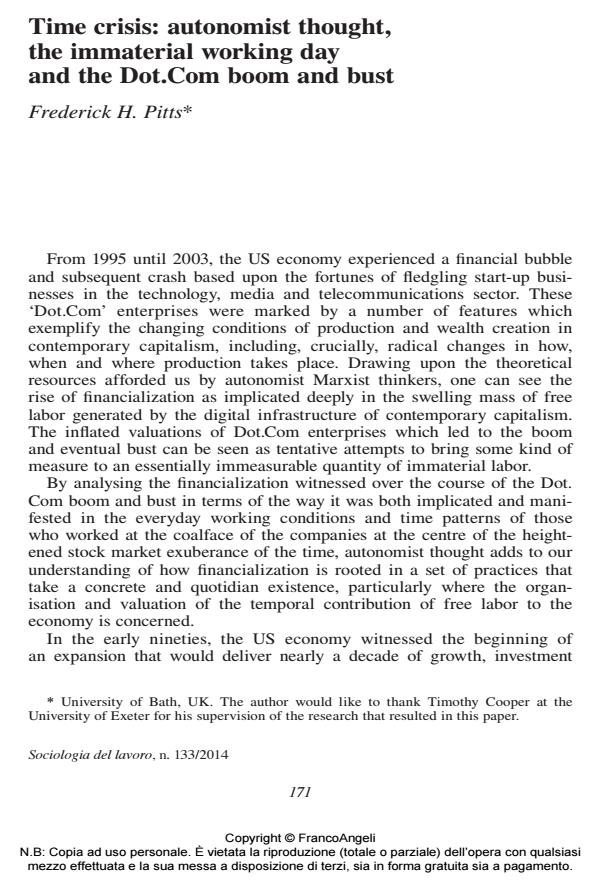Time crisis: autonomist thought, the immaterial working day and the Dot.Com boom and bust
Journal title SOCIOLOGIA DEL LAVORO
Author/s Frederick H. Pitts
Publishing Year 2014 Issue 2014/133
Language English Pages 12 P. 171-182 File size 578 KB
DOI 10.3280/SL2014-133012
DOI is like a bar code for intellectual property: to have more infomation
click here
Below, you can see the article first page
If you want to buy this article in PDF format, you can do it, following the instructions to buy download credits

FrancoAngeli is member of Publishers International Linking Association, Inc (PILA), a not-for-profit association which run the CrossRef service enabling links to and from online scholarly content.
Dal 1995 fino al 2003 l’economia statunitense ha sperimentato una bolla finanziaria e il suo successivo crollo, fondandosi sulle sorti della cosiddetta New economy, composta sostanzialmente dalle neonate start-up del ramo tecnologico, dei media e del settore delle telecomunicazioni. Queste imprese Dot.Com sono state segnate da una serie di caratteristiche che esemplificano i cambiamenti delle condizioni di produzione e di creazione della ricchezza nel capitalismo contemporaneo, tra cui, soprattutto, i mutamenti radicali relativi alle coordinate spaziotemporali delle attività e dei processi produttivi. Utilizzando le risorse teoriche offerte dai pensatori marxisti dell’autonomia, si può osservare come l’aumentata e crescente importanza della finanziarizzazione dilati il peso specifico del lavoro libero generato dalle infrastrutture digitali del capitalismo contemporaneo. Le valutazioni gonfiate delle Dot.Com, che hanno prima portato al boom e successivamente allo scoppio della bolla tecnologica, possono essere visti come dei tentativi sperimentali di produrre un qualche tipo di misura rispetto ad una quantità essenzialmente incommensurabile di lavoro immateriale agito in queste imprese.
Keywords: New Economy, dot.com, Marxism, immaterial labour, measure of labour, enterprise
- Fumagalli A. (2010), “The Global Economic Crisis and Socioeconomic Governance”, in Fumagalli A., Mezzadra S. (eds.), Crisis in the Global Economy, trans. Jason Francis McGimsey, Los Angeles: Semiotext(e), pp. 61-84.
- Fumagalli A., Mezzadra S. (2010), “Nothing Will Ever Be the Same: Ten theses on the financial crisis”, in Fumagalli A., Mezzadra S. (eds.), Crisis in the Global Economy, trans. J.F. McGimsey, Los Angeles: Semiotext(e), pp. 237-272.
- Hardt M., Negri A. (2004), Multitude, London: Penguin.
- Hardt M., Negri A. (2009), Commonwealth, Harvard University Press.
- Lazzarato M. (1996), “Immaterial Labor”, in Virno P., Hardt M. (eds.), Radical Thought in Italy: A Potential Politics, trans. P. Colilli and E. Emory, Minneapolis: University of Minnesota Press, pp. 133-150.
- Marazzi C. (2008), Capital and Language, trans. G. Conti, Los Angeles: Semiotext(e).
- Marazzi C. (2010), The Violence of Financial Capitalism, trans. K. Lebedeva, Los Angeles: Semiotext(e).
- Mezzadra S. (2010), “Introduction”, in Fumagalli A., Mezzadra S. (eds.), Crisis in the Global Economy, trans. J.F. McGimsey, Los Angeles: Semiotext(e), pp. 7-16.
- Ross A. (2003), No-Collar: The Humane Workplace and Its Hidden Costs, New York: Basic Books.
- Tapia A.H. (2004), “The power of myth in the IT workplace: Creating a 24-hour workday during the dot-com bubble”, Information Technology & People, vol. 17, n. 3, pp. 303-326, DOI: 10.1108/09593840410554201TerranovaT.(2010),“NewEconomy,FinancializationandSocialProductionintheWeb2.0”,inFumagalliA.,MezzadraS.(eds.),CrisisintheGlobalEconomy,trans.J.F.McGimsey,LosAngeles:Semiotext(e),pp.153-170
- Vercellone C. (2010), “The Crisis of the Law of Value and the Becoming-Rent of Profit”, in Fumagalli A., Mezzadra S. (eds.), Crisis in the Global Economy, trans. J.F. McGimsey, Los Angeles: Semiotext(e), pp. 85-118
- Virno P. (2004), A Grammar of the Multitude, Los Angeles: Semiotext(e).
- Berardi F. (2009), The Soul at Work, trans. by F. Cadel and G. Mecchia, Los Angeles: Semiotext(e).
- Brenner R. (2002), The Boom and the Bubble, London: Verso.
Frederick H. Pitts, Time crisis: autonomist thought, the immaterial working day and the Dot.Com boom and bust in "SOCIOLOGIA DEL LAVORO " 133/2014, pp 171-182, DOI: 10.3280/SL2014-133012